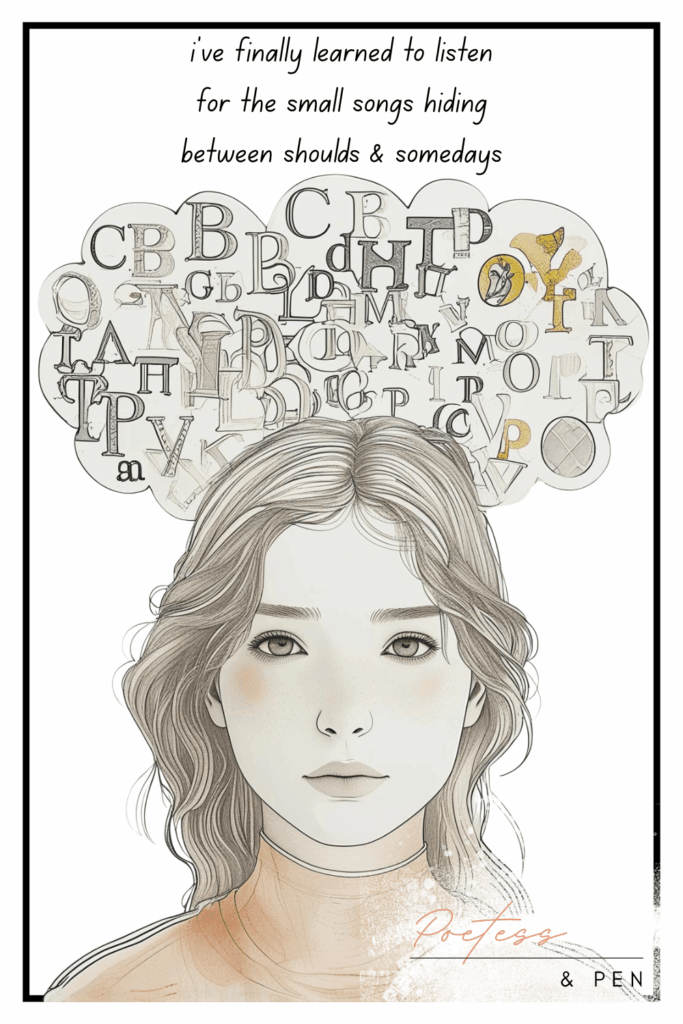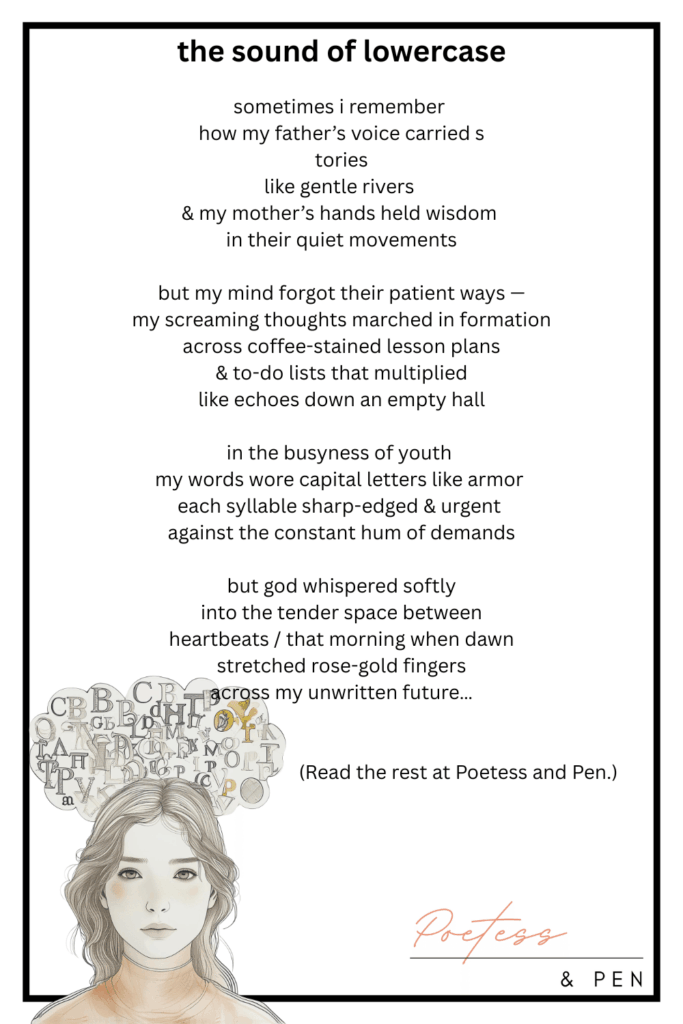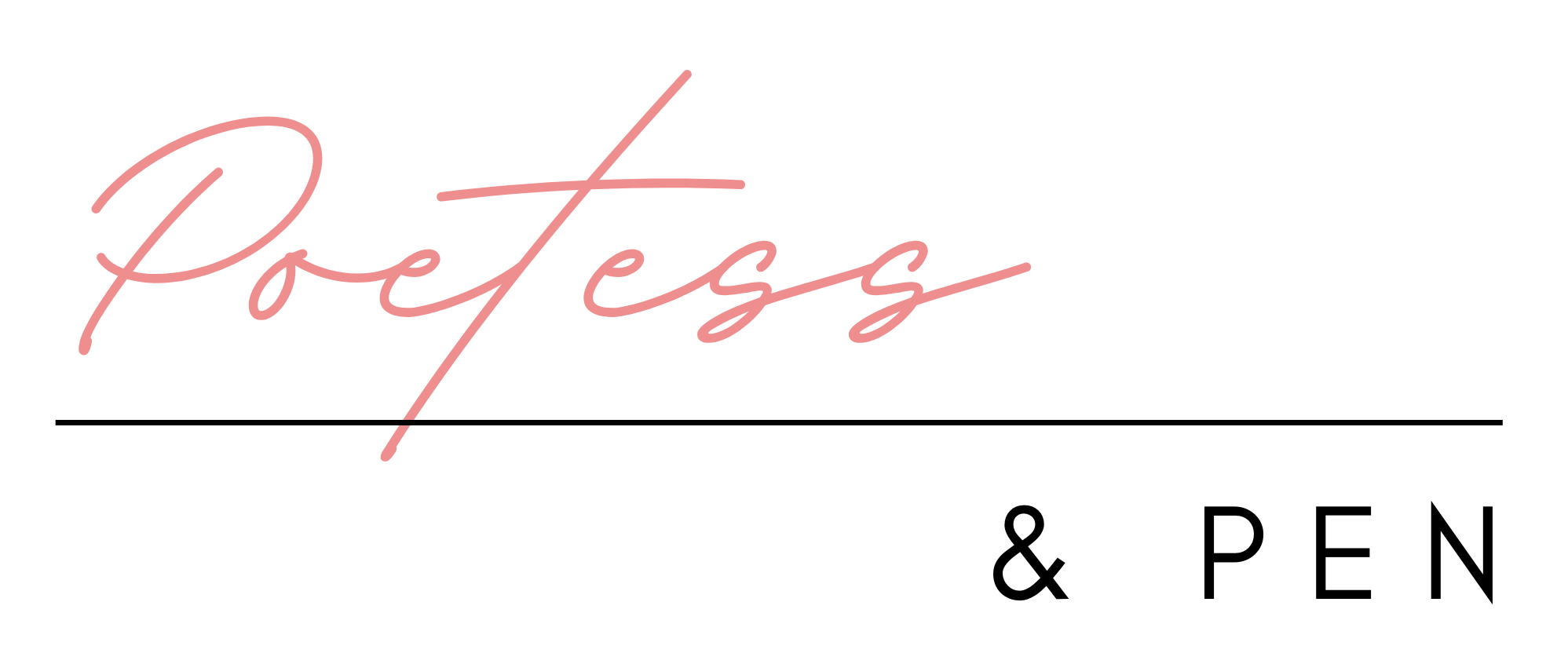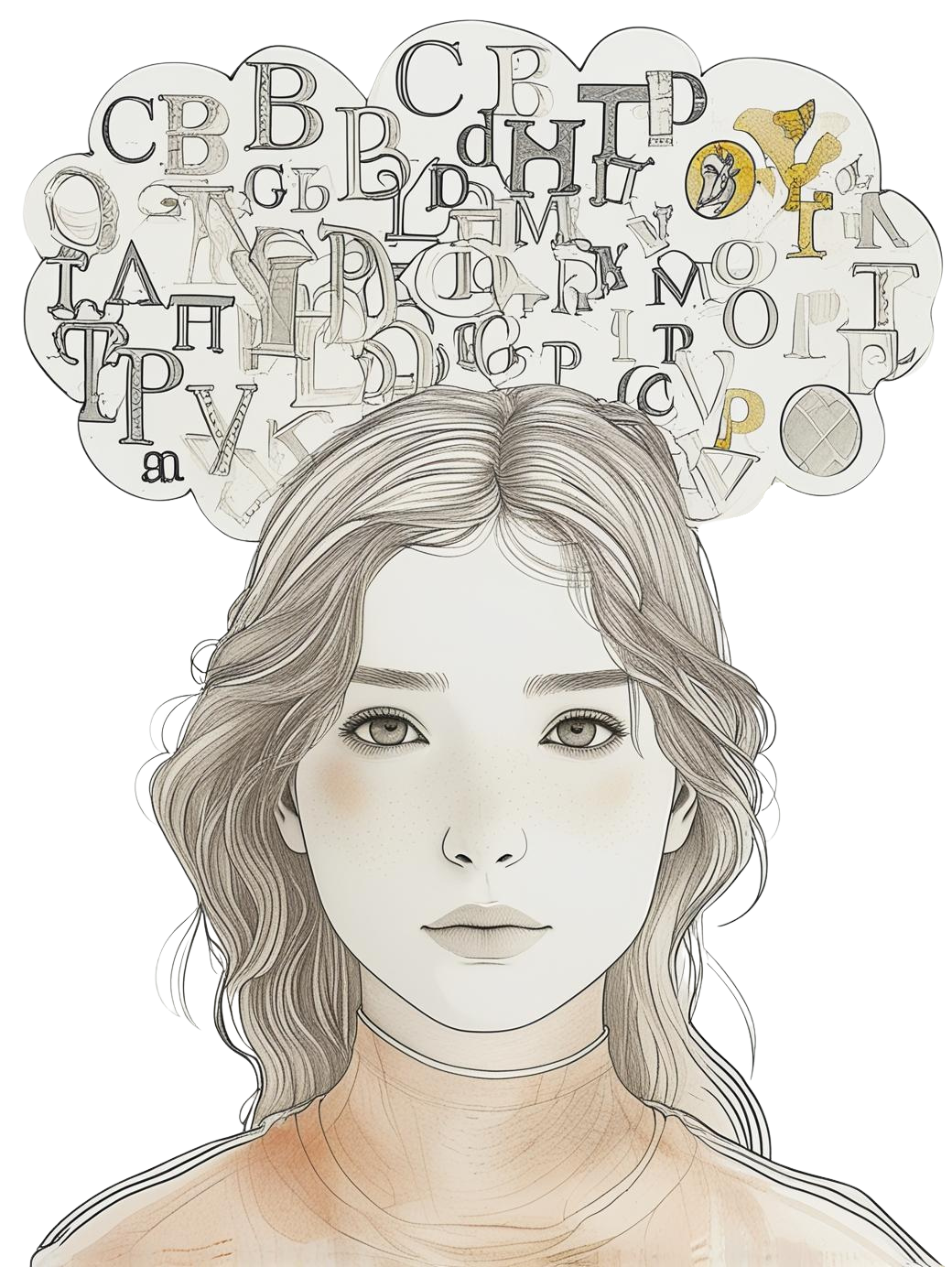Last updated on October 20th, 2025 at 10:29 am
Life has a way of speaking to us through the most unexpected details – even through something as simple as the way we write our letters. For years, my thoughts raced in capital letters while I juggled teaching, family, and endless to-do lists. But sometimes the biggest transformations start with the smallest shifts. Here’s how retiring at 54 and learning to listen to God’s whispers changed not just my life, but even the way my words flow onto the page.
the sound of lowercase
sometimes i can still hear
my father’s voice carrying stories
like gentle rivers
& see my mother’s hands holding wisdom
in their quiet movements
but once my mind forgot their patient ways —
my screaming thoughts marched in formation
across coffee-stained lesson plans
& to-do lists that multiplied
like echoes down an empty hall
in the busyness of youth
my words wore capital letters like armor
each syllable sharp-edged & urgent
against the constant hum of demands
but God whispered softly
into the tender space between
heartbeats one morning - as dawn
stretched rose-gold fingers
across my unwritten future
now… here by the fireplace
where shadows dance their slow waltz
across unfinished chapters
i’ve finally learned to listen
for the small songs hiding
between shoulds & somedays
now i let my letters
curl soft & small
like autumn leaves settling
into evening prayers
my keyboard no longer pounds
with the rhythm of survival;
instead, these lowercase confessions
drift like dandelion wishes
across blank pages
my words have shed
their protective shells
becoming quiet wanderers
traveling between divine whispers
& human thoughts
this is how healing looks -
letters bow their heads
in humble recognition
that the truest stories
often speak in whispers
soft as prayer
tell me… can you hear it too?
the sacred pause between
capital & lowercase
where grace writes itself
in the gentlest of fonts
Mary Kaye Chambers (12/8/24)
Behind the Poem
There was a time when my life felt like it was permanently stuck in caps lock.
You know that feeling – working all day, rushing to ballgames at night, somehow squeezing in homework, laundry, and dishes between breaths. My bank account was perpetually drained, and time with my kids felt like stolen moments between endless tasks. My brain wasn’t just busy; it was screaming every next urgent thing on that never-ending to-do list.
Looking back, if I’d tried writing poetry then, it would have emerged in ALL CAPS – because that’s all my overwhelmed spirit knew how to do.
Shout. Survive. Repeat.
Then came May 2021. A freak accident kept me from finishing the school year, and on that first morning of summer break, something extraordinary happened. In that quiet dawn moment, I heard God’s gentle question: “How does it feel to be retired?”
I remember thinking: “Wait, what? I’m way too young to retire!”
But when that same question came again, something deep inside me shifted. Within an hour, I had filled out my retirement paperwork and faxed it in. Sometimes the biggest decisions come in whispers, not shouts.
The path wasn’t easy. I’d lost my beloved daddy at the start of that school year. The accident took months to heal. Then came the heart-wrenching loss of my dear momma. But now, four years after following that divine nudge to step away from teaching and embrace writing, something beautiful has emerged: my brain has finally stopped shouting.
A few nights ago, I was sitting by the fireplace, peacefully writing in my journal when a friend messaged about a poet she admired. It sparked something in me – a remembrance of the teenage girl who once loved crafting poetry. The urge to write verse again arose like a gentle wave, and when the words began flowing, they naturally came in lowercase.
Because here’s the truth:
my thoughts no longer come from that place of perpetual overwhelm
They emerge from that small, still space within – that quiet corner where God’s whispers are clearer than the world’s shouts. My lowercase letters are more than a style choice; they’re a testimony to the journey from chaos to calm, from survival mode to sacred stillness.
This is why I write poetry in lowercase now… because sometimes the quietest voice carries the most profound truth.
And the periods and commas? I leave most of those behind too. After decades of wielding red pens and marking every missing punctuation mark, after years of drilling proper grammatical structure into young minds, there’s a quiet rebellion in letting my thoughts flow freely across the page. No more semicolons standing guard between independent clauses. No more commas marching in perfect formation. These days, I let my words breathe where they need to, pause where they want to. It’s another way of shedding that teacher’s armor I wore for so long – another step in reclaiming my voice from the rigid structures that once defined my days.
Like my spirit, my words have finally learned to breathe freely – no capitals to weigh them down, no punctuation to cage them in. They flow now, like prayers whispered in the quiet hours, finding their own natural rhythm in this beautifully unstructured life.
How to Find Your Authentic Writing Voice
If you’re feeling drawn to explore a more natural, unstructured way of writing, here are some practical ways to begin:
Start with Morning Pages
Set aside 15 minutes each morning to write without rules. Don’t worry about capitals, punctuation, or grammar. Just let your thoughts flow onto the page exactly as they come to you.
Create a “No Rules” Document
Keep a special document or journal where you give yourself complete freedom from every writing rule you learned in school. Make this your safe space to experiment.
Notice Your Natural Voice
Pay attention to how you actually think and speak. Do your thoughts come in complete sentences? Or do they flow more like poetry? Let your writing mirror your authentic inner voice.
Practice Digital Freedom
Try turning off auto-capitalization on your phone or computer. See how it feels to let your thumbs and fingers type without automatic corrections.
Listen to Your Resistance
When you feel yourself tensing up about “proper” writing rules, ask yourself why. What were you taught about “correct” writing? What rules no longer serve your current purpose?
Remember: You aren’t writing a term paper or a business report. This is your personal creative expression – it’s allowed to break every rule in the English teacher’s handbook.
🖋️ Journal Prompt
Choose a moment when something shifted in your life – it could be dramatic like retirement or subtle like a change in morning habits. Think about how you carried yourself before and after. What was the texture of your thoughts? The rhythm of your days? The volume of your inner voice?
💌 Before You Go
If this reflection stirred something quiet within you, take a few minutes to journal today. Ask yourself: Where is God whispering in your life right now? Then share your thoughts or your own lowercase moment in the comments. Your story might be the whisper someone else needs to hear.

Why do you write poetry in lowercase?
In texting, all caps are a way of shouting — and I no longer live with a mind that shouts at me 24/7. Writing in lowercase helps also me quiet the noise of perfectionism. It’s a reminder that vulnerability and gentleness have their own kind of strength.
Are there any words you capitalize in your poetry?
Only one — God. Every other word rests quietly in lowercase as a reflection of humility and calm, but His name stands apart in reverence. It’s my way of showing that even in the softest whispers, His presence is still the highest word on the page.
How can I find my own writing voice?
Start by letting go of “shoulds.” Journal freely, without editing, and notice which words feel most like you. The voice you use when you’re not trying to impress anyone is often your truest.
Can writing really help you heal?
Absolutely. Writing slows the mind enough to listen to what the heart is trying to say. It’s one of the simplest forms of self-care and spiritual reflection.
📖 Glossary
Morning Pages – A daily writing ritual of unfiltered thoughts meant to clear mental clutter and spark creativity.
Whispers – The subtle, quiet nudges from God or intuition that guide us toward peace.
Lowercase Writing – A gentle, unhurried writing style symbolizing humility, calm, and authenticity — embraced by the poetess Mary Kaye Chambers as a reflection of peace after years of noise. It represents a quieter mind and a heart attuned to God’s whispers, where words no longer need to shout to be heard.
Stillness – The spiritual quiet that allows you to hear divine guidance more clearly.
Authentic Voice – The natural rhythm and tone that reflect your true self on the page.
Grace – The divine tenderness that meets us in our imperfections.
📍Don’t Forget To Save This Article On Pinterest ⤵︎



